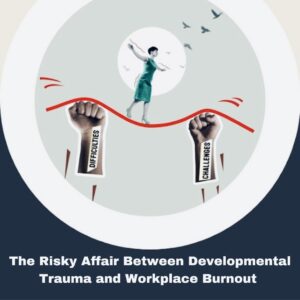
Embracing Imperfections
Disclaimer: Before we delve into this discussion, it’s essential to acknowledge that we’re not advocating for staying in abusive or unsafe relationships. If you’re in

Childhood is often envisioned as a time of innocence and carefree joy. However, for some, it can be a time marked by adversity and trauma that casts a long shadow into adulthood. Developmental trauma, commonly referred to as childhood trauma, can have profound and lasting effects on a person’s life. In some cases, these experiences give rise to a complex condition known as Complex Post-Traumatic Stress Disorder (C-PTSD). In this blog, we’ll delve into the intricacies of developmental trauma, explore the concept of C-PTSD, shed light on how these experiences can shape adult lives, and discover ways to heal.
Unveiling Developmental Trauma: Developmental trauma encompasses a range of adverse experiences that occur during a person’s early years. This might include physical, emotional, or sexual abuse, neglect, exposure to domestic violence, or growing up in an unstable environment. These traumatic events disrupt the normal course of emotional and psychological development, leaving an indelible impact on a person’s sense of self and the way they perceive the world.
The Complex Picture of C-PTSD: Complex Post-Traumatic Stress Disorder (C-PTSD) emerges as a response to repeated and prolonged exposure to developmental trauma. It goes beyond the well-known symptoms of traditional PTSD and encompasses a broader range of challenges. People with C-PTSD often struggle with emotional regulation, forming and maintaining healthy relationships, and developing a stable self-concept. The disorder can be characterized by symptoms like chronic feelings of emptiness, shame, and a distorted self-image.
The Echoes in Adulthood: The effects of childhood trauma and C-PTSD resonate strongly in adulthood, shaping various aspects of a person’s life:
Path to Healing: Recovery from developmental trauma and C-PTSD is a journey that involves a combination of therapeutic interventions and self-care strategies. Trauma-focused therapies like eye movement desensitization and reprocessing (EMDR) and parts work can aid in processing and healing from traumatic experiences. Cultivating supportive relationships, adopting healthy lifestyle choices, and practicing self-care play pivotal roles in the healing process.
Taking Action: Attending our Trauma Retreat: One powerful step in healing from developmental trauma is attending a trauma retreat. These retreats offer a supportive and immersive environment where individuals can explore their past traumas, learn coping mechanisms, and connect with others who have faced similar challenges. Under the guidance of trained professionals, participants can gain insights, tools, and strategies to navigate the healing journey. Consider researching and attending a trauma retreat to take a proactive step towards healing.
Embracing Shadows, Illuminating Hope,
Chelsey Fjeldheim, LCSW
Empowering Souls on the Path of Healing
Copyright © 2023 Chelsey Fjeldheim, Courage Speaks Counseling

Disclaimer: Before we delve into this discussion, it’s essential to acknowledge that we’re not advocating for staying in abusive or unsafe relationships. If you’re in

In the dimly lit corridors of office intrigue, a tantalizing affair unfolds—one that melds the secrets of the past with the demands of the present.

Introduction Developmental trauma is a profound and complex phenomenon that can have lasting effects on an individual’s emotional, psychological, and social development. Emerging from adverse

Because you matter. You are important. You are worth it.